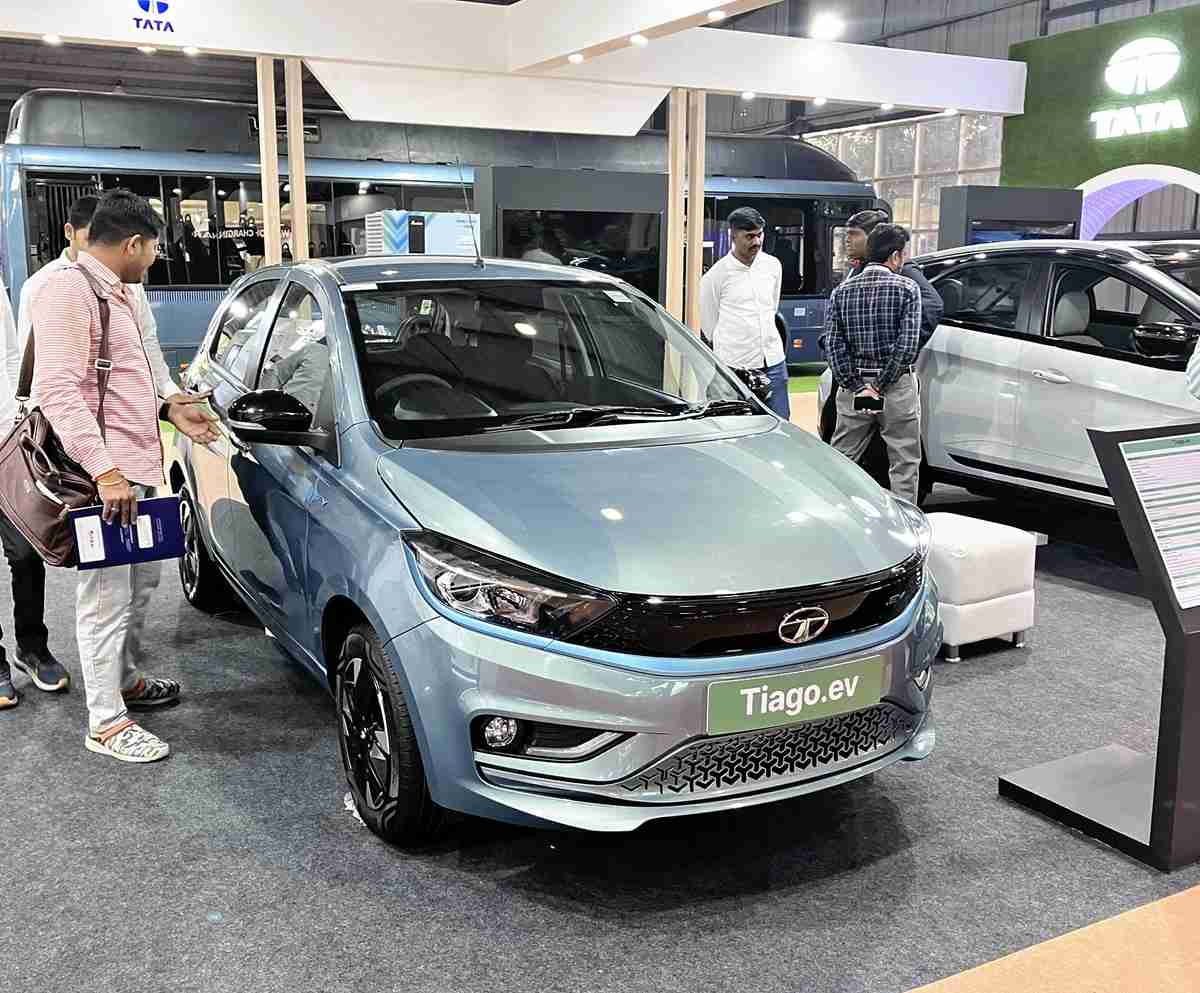
Tata Motors Ltd.’s EV is displayed at an investment attraction event in Gandhinagar, India.
21:00 JST, February 18, 2024
GANDHINAGAR, India — With the Indian government promoting the spread of electric vehicles, its EV market is expected to expand in the world’s third-largest automotive market after China and the United States.
Several countries are increasing their investments in the Indian EV market.
Chinese carmakers have a smaller presence in the country’s EV market compared to other Asian countries, while Japanese and other automakers are stepping up investments.
Suzuki enters market
Suzuki Motor Corp. plans to build a new EV production line at a plant in the western Indian state of Gujarat, Suzuki President Toshihiro Suzuki announced at an investment attraction event held in the state in early January.
“Suzuki will start EV production at the end of this year, Suzuki said at the event. “We will continue to invest [in EV].”
The automaker plans to invest a total of 382 billion rupees (about ¥680 billion) to expand its existing plants and build a new EV production plant.
According to JATO Dynamics Ltd., a U.K.-based research firm, EV sales in India grew to about 95,000 units in 2023, or just over 2% of the amount of passenger cars. The number is about double the 2022 figure and six times the 2021 figure.
EV sales in India are notable given that year-over-year passenger car sales rose 8.4% to about 4.14 million units.
The Indian government has set a target that 30% or more of new car sales will be EVs by 2030 and is working on measures such as subsidies to encourage the use of EVs.
Suzuki holds over a 40% share of the passenger car market in India but the majority is controlled by local conglomerate Tata Motors Ltd., which holds a 70% share of the EV market.
As for Honda Motor Co., it has announced a plan to launch an EV sport utility vehicle in India by 2026.
Foreign automaker battle
Chinese automakers, which collectively hold an 80% share of the EV market in Thailand, dominate Japanese, U.S. and European competitors in Asian countries.
However, the market share of Shanghai Automotive Industry Corp. in India is 13.5% and BYD Co. holds only 2.8%.
This is likely partly due to the tense relations between China and India over territorial disputes.
Automakers other than those in China see the push in India as a good opportunity to expand EV sales. U.S. EV giant Tesla Inc. is in talks with the Indian government to build a factory in the country.
Vietnamese startup Vinfast Auto Ltd. is expected to operate a new plant in 2026.
South Korea’s Hyundai Motor Co. also plans to invest 200 billion rupees by 2032 to build an EV production system in India.
As India continues its transition to electric vehicles, the battle among automakers to capture this huge market of more than 1.4 billion people is expected to intensify.
"World" POPULAR ARTICLE
-

8 Japanese Nationals Stranded on Indonesia’s Sumatra Island
-

U.S. Senate Resolution Backs Japan, Condemns China’s Pressure
-

Mozambican Cooking Class Held in Matsuyama, Ehime Pref.; Participants Don Aprons, Bandanas Made from Traditional Mozambique Fabric
-

China to Impose Sanctions on Shigeru Iwasaki, Former Head of Japan’s Self-Defense Forces, Who Serves as Adviser to Taiwan’s Executive Branch
-

South Korea’s Top Court Dismisses Nippon Steel Appeal in Lawsuit over Requisitioned Worker
JN ACCESS RANKING
-

Tokyo Economic Security Forum to Hold Inaugural Meeting Amid Tense Global Environment
-

Keidanren Chairman Yoshinobu Tsutsui Visits Kashiwazaki-Kariwa Nuclear Power Plant; Inspects New Emergency Safety System
-

Imports of Rare Earths from China Facing Delays, May Be Caused by Deterioration of Japan-China Relations
-

University of Tokyo Professor Discusses Japanese Economic Security in Interview Ahead of Forum
-

Japan Pulls out of Vietnam Nuclear Project, Complicating Hanoi’s Power Plans






















